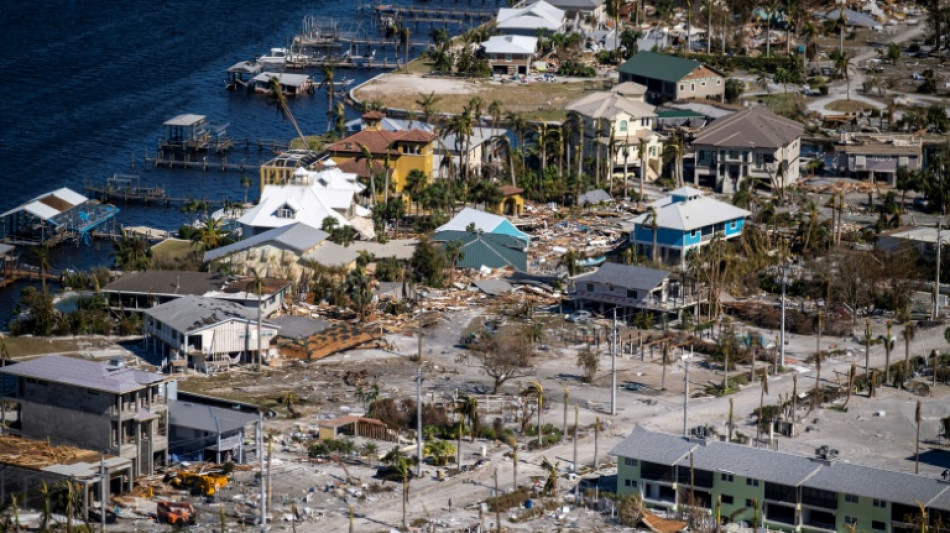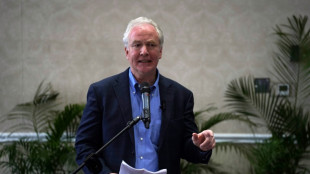
-
 SFWJ / Medcana Announces Strategic Expansion Into Australia With Acquisition of Cannabis Import and Distribution Licenses
SFWJ / Medcana Announces Strategic Expansion Into Australia With Acquisition of Cannabis Import and Distribution Licenses
-
Arsenal's Havertz could return for Champions League final

-
 US officials split on Ukraine truce prospects
US officials split on Ukraine truce prospects
-
Client brain-dead after Paris cryotherapy session goes wrong

-
 Flick demands answers from La Liga for 'joke' schedule
Flick demands answers from La Liga for 'joke' schedule
-
'Maddest game' sums up Man Utd career for Maguire

-
 Trial opens for students, journalists over Istanbul protests
Trial opens for students, journalists over Istanbul protests
-
Gaza rescuers say Israeli strikes kill 24 after Hamas rejects truce proposal

-
 'Really stuck': Ukraine's EU accession drive stumbles
'Really stuck': Ukraine's EU accession drive stumbles
-
'Not the time to discuss future', says Alonso amid Real Madrid links

-
 74 killed in deadliest US attack on Yemen, Huthis say
74 killed in deadliest US attack on Yemen, Huthis say
-
Southgate's ex-assistant Holland fired by Japan's Yokohama

-
 Vance meets Meloni in Rome before Easter at the Vatican
Vance meets Meloni in Rome before Easter at the Vatican
-
Ryan Gosling to star in new 'Star Wars' film

-
 Hamas calls for pressure to end Israel's aid block on Gaza
Hamas calls for pressure to end Israel's aid block on Gaza
-
Russia says Ukraine energy truce over, US mulls peace talks exit

-
 58 killed in deadliest US strike on Yemen, Huthis say
58 killed in deadliest US strike on Yemen, Huthis say
-
Museums rethink how the Holocaust should be shown

-
 Three dead after deadly spring storm wreaks havoc in the Alps
Three dead after deadly spring storm wreaks havoc in the Alps
-
No need for big changes at Liverpool, says Slot

-
 Bloody Philippine passion play sees final performance of veteran 'Jesus'
Bloody Philippine passion play sees final performance of veteran 'Jesus'
-
New US envoy prays, delivers Trump 'peace' message at Western Wall

-
 Postecoglou sticking around 'a little longer' as Spurs show fight in Frankfurt
Postecoglou sticking around 'a little longer' as Spurs show fight in Frankfurt
-
US threatens to withdraw from Ukraine talks if no progress

-
 Tears and defiance in Sumy as Russia batters Ukraine border city
Tears and defiance in Sumy as Russia batters Ukraine border city
-
Russia rains missiles on Ukraine as US mulls ending truce efforts

-
 Tokyo leads gains in most Asian markets on trade deal hopes
Tokyo leads gains in most Asian markets on trade deal hopes
-
Two missing after deadly spring snowstorm wreaks havoc in the Alps

-
 'War has taken everything': AFP reporter returns home to Khartoum
'War has taken everything': AFP reporter returns home to Khartoum
-
US strikes on Yemen fuel port kill 38, Huthis say

-
 Slegers targets Lyon scalp in pursuit of Arsenal European glory
Slegers targets Lyon scalp in pursuit of Arsenal European glory
-
'Defend ourselves': Refugee girls in Kenya find strength in taekwondo

-
 China's manufacturing backbone feels Trump trade war pinch
China's manufacturing backbone feels Trump trade war pinch
-
Sri Lankans throng to Kandy for rare display of Buddhist relic

-
 Chinese vent anger at Trump's trade war with memes, mockery
Chinese vent anger at Trump's trade war with memes, mockery
-
Heartbroken Brits abandon pets as living costs bite

-
 Mongolian LGBTQ youth fight for recognition through music, comedy
Mongolian LGBTQ youth fight for recognition through music, comedy
-
Cash crunch leaves Syrians queueing for hours to collect salaries

-
 Lyon left to regroup for Champions League bid after painful European exit
Lyon left to regroup for Champions League bid after painful European exit
-
Unravelling Real Madrid face Athletic Bilbao Liga test

-
 Napoli disturbing buoyant Inter's peace in Serie A Easter bonanza
Napoli disturbing buoyant Inter's peace in Serie A Easter bonanza
-
Disappointed Dortmund chase consistency with Europe at stake

-
 Asian markets mixed as traders track tariff talks
Asian markets mixed as traders track tariff talks
-
Yan and Buhai share lead at LA Championship

-
 Under fire at debate, Canada PM Carney tries to focus on Trump
Under fire at debate, Canada PM Carney tries to focus on Trump
-
Liverpool poised for Premier League coronation, Leicester, Ipswich for relegation

-
 India's elephant warning system tackles deadly conflict
India's elephant warning system tackles deadly conflict
-
US senator meets wrongfully deported Salvadoran migrant

-
 Gustavo Dudamel: the superstar conductor building bridges to pop
Gustavo Dudamel: the superstar conductor building bridges to pop
-
Japan rice prices soar as core inflation accelerates


Why more Americans are flocking to Florida, even as hurricanes intensify
There's nothing in the world that would convince Cape Coral resident Kenneth Lowe to leave -- not even having to empty his home of flood water a week after Hurricane Ian pummeled the city.
"Southwest Florida is my heaven on earth and hurricanes come with South Florida. So you just have to take it," the 28-year-old tells AFP, standing in a street strewn with debris.
"It's my favorite place, it's worth it."
Experts warn the frequency of supercharged hurricanes and floods in this climate-prone region is only expected to increase over time -- but the population of the southeastern United States continues to rise.
The paradox is especially striking in Cape Coral.
Between 2010 and 2021, its population grew by 33 percent to 204,000 people, according to census data. Founded in 1958, it embodies the Florida dream that many come looking for.
Navigable canals criss-cross the region, connecting to the Caloosahatchee River, which gives way to the Gulf of Mexico. This affords many people the chance to enjoy a house on the water, and even space for a small boat.
But developing Cape Coral meant first draining the swamp it was built on -- and destroying the mangroves and coral reefs that acted as natural defenses against waves and storm surges.
The city was pulverized by Ian, which intensified especially rapidly, fueled by warm waters and high humidity.
A study in Nature Communications earlier this year found that due to climate change, Atlantic hurricanes dump around 10 percent more water during their rainiest three-hours.
In the streets of Cape Coral, dozens of residents are now piling up their belongings in front of their homes: beds, cupboards, refrigerators that have become unusable.
"We will just rebuild and, hopefully, it will be another 100 years before the next big one," said Tamara Lang, 56.
Lang moved from Chicago and bought her house in Cape Coral just a few months ago -- and says she didn't factor hurricanes into her decision. But she too has no intention of leaving.
"We love it here," she said. "This has been our happy place since we got it."
- Rapid growth -
According to sociologist Mathew Hauer, who studies the impacts of climate change on society, people are not adequately informed about the risks they are taking on.
"If people really understood the flood risk of properties, we'd see changes in where people are purchasing homes and where they're choosing to live," said Hauer, an assistant professor at Florida State University.
Another problem: flood zone maps drawn up by the Federal Emergency Management Agency (FEMA) are out of date, says Gavin Smith, a professor of landscape architecture and environmental planning at North Carolina State University.
"It should be viewed as a minimum standard, but they're often used to regulate the where and how of development," he told AFP.
Census data reveals a population explosion in the coastal counties of North and South Carolina, as well as Georgia. Florida itself added 2.7 million residents between 2010 and 2020.
"It's one of the fastest growing regions in the US," said Hauer, adding: "I don't see any sign yet that the trend toward migration down into the Sunbelt is going to turn."
But according to a paper he published in Nature Climate Change, if sea levels rise around three feet (0.9 meters) between now and the end of the century, some 4.3 million people in the continental United States would be forced to move.
Coastal residents of Florida make up about half that figure.
- 'Immobility paradox' -
Retirees from northern climes -- including seasonal migrants known as snowbirds -- have long been drawn to the "Sunshine State."
In addition to their beauty, the state's coastlines are a vital economic resource, supporting a massive tourism industry.
And once you're settled, it's not easy to relocate.
Sixty-seven percent of Americans would rather rebuild than leave an area impacted by a severe weather event, according to a 2021 Marist Poll.
"This is what we call the immobility paradox," said Hauer.
A psychological tendency against giving up surely factors into the decision-making -- but there are also social dimensions like leaving loved ones, and the harsh economic constraint of having to find a new job, he added.
Smith notes that discounting the true risks one faces is a "universal human trait."
"I don't think we are going to leave because we have nowhere to go," said Irene Giordano, 56, who moved south in 2019 from Virginia to Cape Coral.
During Ian, water rose a foot-and-a-half high in her house.
"I'm praying that this is the last one in my lifetime," she said.
M.Fischer--AMWN



